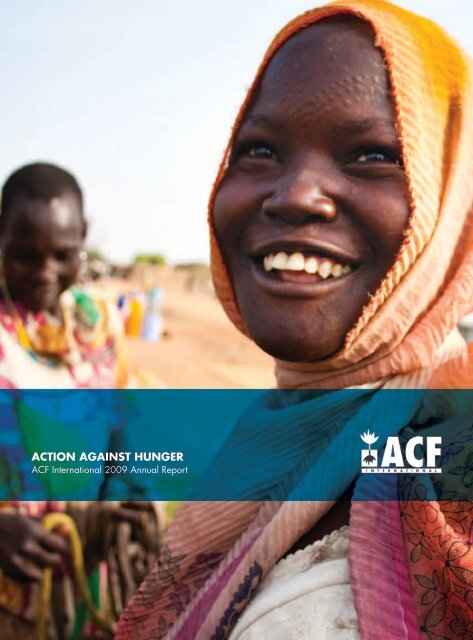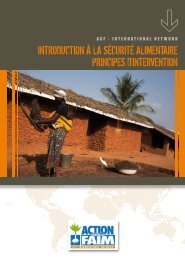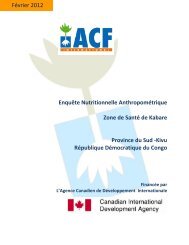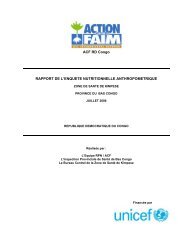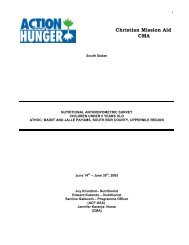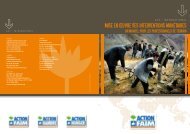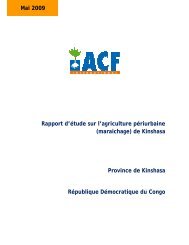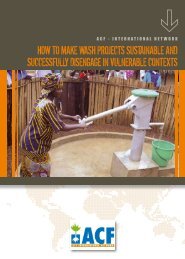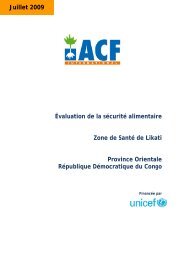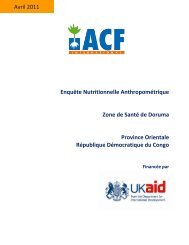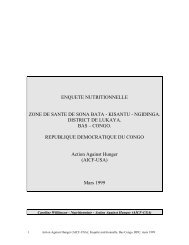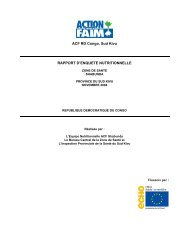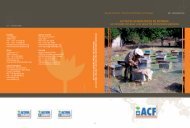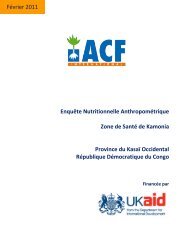ACF International Annual Report 2009 - Action Against Hunger
ACF International Annual Report 2009 - Action Against Hunger
ACF International Annual Report 2009 - Action Against Hunger
You also want an ePaper? Increase the reach of your titles
YUMPU automatically turns print PDFs into web optimized ePapers that Google loves.
<strong>Action</strong> <strong>Against</strong> <strong>Hunger</strong><strong>ACF</strong> <strong>International</strong> <strong>2009</strong> <strong>Annual</strong> <strong>Report</strong>
<strong>ACF</strong> INTERNATIONALComprised of five independent, non-profit organizations with headquarters in London, Madrid, Montréal, NewYork, and Paris, <strong>ACF</strong> <strong>International</strong> saves the lives of malnourished children while providing families with accessto safe water and sustainable solutions to hunger. <strong>ACF</strong> bridges emergency relief with longer-term interventions inemergency situations of conflict, natural disaster, and chronic food insecurity. Our 4,600+ field staff—seasonedprofessionals and technical experts in nutrition, water and sanitation, public health, and food security—carry outlife-saving programs in more than 40 countries. These programs reach nearly five million people a year, restoringdignity, self-sufficiency, and independence to vulnerable populations around the world.<strong>ACF</strong>-USAwww.actionagainsthunger.orgChairman: Raymond DebbaneExecutive Director: Nan Dale<strong>ACF</strong>-Francewww.actioncontrelafaim.orgPresident: Denis MetzgerExecutive Director: François Danel<strong>ACF</strong>-Spainwww.accioncontraelhambre.orgPresident: José Luis Leal MaldonadoExecutive Director: Olivier Longué<strong>ACF</strong>-UKwww.actionagainsthunger.org.ukChairman: Paul WilsonExecutive Director: Jean-Michel Grand<strong>ACF</strong>-Canadawww.actioncontrelafaim.caPresident: Diane BussandriExecutive Director: Richard VeenstraReflects the leadership of each <strong>ACF</strong>headquarters as of December 31, <strong>2009</strong>Cover photos: photo: <strong>ACF</strong>-Sudan, <strong>ACF</strong>-Afghanistan, courtesy courtesy J. Seagle, I. Eshragi/Agence Counterpart Images VU; <strong>ACF</strong>-Sri Lanka, courtesy J. Lapegue
LETTER FROM THE CHAIRMAN<strong>Action</strong> <strong>Against</strong><strong>Hunger</strong> CorePrinciplesThe <strong>ACF</strong> <strong>International</strong> Charteraffirms six core principles that allstaff members worldwide pledge touphold in carrying out their work.IndependenceNeutralityFor 30 years, <strong>Action</strong> <strong>Against</strong> <strong>Hunger</strong> | <strong>ACF</strong> <strong>International</strong> has been fightingwhat is now an old and well-known enemy: <strong>Hunger</strong>.Today, an epidemic of childhood malnutrition devastates communities innations throughout sub-Saharan Africa like the Democratic Republic ofCongo, Niger, Chad, and Mali. And in countries as diverse as Guatemala,Afghanistan, and Bangladesh, millions of people are, more than ever,in need of food. Malnutrition has become an insidious disease spreadinginto the poorest populations. Among the nearly three billion inhabitants ofour planet surviving on less than two dollars a day, one billion suffer fromunder-nutrition.action against hungerNon-DiscriminationFree and DirectAccess to VictimsProfessionalismTransparencyBut hunger is not a question of shortages; largely, it is the result of neglectand poor policy decisions. At the dawn of the 21st century, we have thetools and the knowledge to end hunger, but we lack the political will todo it. While $4 to $9 billion a year would be enough to eradicate severeacute malnutrition—the deadliest form of hunger—the wealthiest nations giveaway $1 billion every day to subside their farmers, and large corporationsspend billions more on executive compensation and bonuses.Faced with these stark realities, <strong>ACF</strong> is waging a battle against hunger onthree fronts. First, we save lives threatened by acute malnutrition and providecommunities with the tools to get back on their feet after a crisis. Second,we bring our contribution to the fight against selfishness and complacencythrough testimony and advocacy. Finally, we take leadership in a growingmovement to convince the wealthiest countries to consume differently andhelp the world’s poorest nations produce more efficiently. Our life-savinghumanitarian work is three-fold: treatment for those most severely affected byacute malnutrition—infants, young children, pregnant women, and nursingmothers—with Ready-to-Use Foods like Plumpy’nut and other supplementaryproducts; vital programs in water, sanitation, and hygiene; and support forfamilies to access food through the distribution of seeds and tools, training inagricultural techniques, and a range of income-generating activities.ON THE COVEROur comprehensive approach toglobal hunger delivers a range ofcommunity-centered solutions topopulations in crisis, like this woman’scommunity in southern Sudan.As a leader in our field, we are more committed than ever to confrontingone of the most serious challenges of our time: the injustice of hunger. Onbehalf of the <strong>International</strong> Chairmen’s Council, I am proud to present thisreport highlighting some of <strong>ACF</strong>’s key accomplishments in <strong>2009</strong>.Denis MetzgerChairman, <strong>International</strong> Chairman’s Council<strong>ACF</strong> INTERNATIONAL1
ACTION AGAINST HUNGERA UNIQUE INTERNATIONAL NETWORKFor almost30 years, <strong>Action</strong><strong>Against</strong> <strong>Hunger</strong>has led the wayin defining theidea of globalpartnership.Our comprehensive solutions to global hunger are needsbased,context-specific, and customized through directcommunity participation. While the programs we runmay vary from one country to the next, they all share thisdefining set of characteristics:Comprehensive: <strong>Action</strong> <strong>Against</strong> <strong>Hunger</strong> integrates activities innutrition, food security & livelihoods, water, sanitation & hygiene, andadvocacy. To tackle the underlying causes of hunger, we address thesocial, organizational, technical, and resource concerns essential to acommunity’s well-being.Lasting Solutions: <strong>Action</strong> <strong>Against</strong> <strong>Hunger</strong> works to ensure ourprograms can be sustained without us. By integrating our programswith local and national health systems, we transform effective, short-terminterventions into sustainable, long-term solutions.Community-Centered: A community-centered approach is keyto building local capacity for the management and maintenance of ourprograms. Through training, workshops, technical support, and mentoring,<strong>Action</strong> <strong>Against</strong> <strong>Hunger</strong> builds local capacity and cultivates communityknow-how for the long-run.Independent & Impartial: As a nongovernmental humanitarianagency, <strong>ACF</strong> is apolitical. But when it comes to human suffering, we arenot neutral: We do our utmost to deliver effective assistance whenever andwherever it’s most needed.Full Accountability & Transparency: <strong>Action</strong> <strong>Against</strong><strong>Hunger</strong> directly implements and oversees all of its programs, requiring fullaccess to communities targeted for assistance. Committed to transparencyand full disclosure, <strong>ACF</strong> ensures key financial information is publiclyavailable and that its programs undergo external evaluation to assesstheir impact.22<strong>ACF</strong>-Guatemala, courtesy J. Salamanca
<strong>ACF</strong>’S INTEGRATED APPROACH TO FIGHTING HUNGERToday, a billion peoplesuffer from hungerand lack access toclean drinking water.Through an integratedapproach incorporatingNutrition, Food Security& Livelihoods, Water,NutritioN: Nutrition programsaim at assessing, preventing andtreating acute malnutrition amongthe most vulnerable populations,especially young children andpregnant or lactating women.Health programs consist of fightingdiseases linked with malnutrition.WATER, SANITATION &HYGIENE: These programsaim at guaranteeing access todrinking water and good sanitaryconditions (by providing wells,water distribution networks,latrines, hygiene educationsessions, etc.).Sanitation & Hygiene, andFOOD SECURITY &ADVOCACY: <strong>Action</strong> <strong>Against</strong>Advocacy, <strong>Action</strong> <strong>Against</strong>Livelihoods: <strong>Action</strong><strong>Hunger</strong> seeks to alert and influence<strong>Hunger</strong> responds efficiently<strong>Against</strong> <strong>Hunger</strong>’s food security the international community whenand effectively to helpprograms include both emergency fundamental rights such as access tovulnerable populationsprograms—such as emergency water or food are violated. <strong>Action</strong>around the world.food distributions—as well as longterm<strong>Against</strong> <strong>Hunger</strong>’s advocacy effortsinterventions. These programsaim at boosting agricultural and/or economic activity, providingaim at affecting institutional andpolicy changes to help create aworld without hunger.populations with sufficient accessto food of a satisfactory qualityand improving self-sufficiency.action against hunger<strong>ACF</strong>’s programsprovide immediateassistance andlong-term relief tomalnourished childrenand their families.Our food security &livelihoods programsoffer a broad rangeof solutions forgenerating incomeand food production.<strong>ACF</strong> ensureseffective assistanceby working directlywith communitiesto customize lastingsolutions to hunger.<strong>ACF</strong> INTERNATIONAL(From left): <strong>ACF</strong>-Mali; <strong>ACF</strong>-Uganda, courtesy T. Frank; <strong>ACF</strong>-Uganda, courtesy T. Frank3
PROGRAM MAPARMENIAMALICHADGUATEMALAHAITINIGERMAURITANIAGUINEANICARAGUACOLOMBIASIERRA LEONELIBERIAIVORY COASTECUADORPERUBURKINA FASODEMOCRATIC REPUBLICOF THE CONGO (DRC)ANGOLABOLIVIAPARAGUAYIn <strong>2009</strong>, some 4.6 millionpeople around the worldbenefited from <strong>ACF</strong>’s programs.The breadth of <strong>Action</strong> <strong>Against</strong> <strong>Hunger</strong>’s internationalexpertise goes beyond the scope of our currentprograms. Additionally, we have worked in manyother countries, including Bosnia-Herzegovina,Cambodia, Cameroon, North Korea, Mozambique,Macedonia, Rwanda, and Tanzania.This map reflects the reach of <strong>ACF</strong> <strong>International</strong> as ofDecember 31, <strong>2009</strong>.4
NORTH CAUCASUSGEORGIASYRIALEBANONAFGHANISTANPALESTINIANTERRITORIESAZERBAIJANMONGOLIAMYANMARaction against hungerSUDANETHIOPIASOMALIACENTRAL AFRICAN REPUBLICKENYAPHILIPPINESUGANDABANGLADESHINDONESIAMALAWISWAZILANDZIMBABWELESOTHO(From left): <strong>ACF</strong>-Sudan, courtesy J. Seagle, Counterpart Imges; <strong>ACF</strong>-Sudan, courtesy J. Seagle,Counterpart Images; <strong>ACF</strong>-Georgia; <strong>ACF</strong>-Indonesia; <strong>ACF</strong>-Sudan, courtesy J. Seagle, Counterpart Images<strong>ACF</strong> INTERNATIONAL5
SELECT PROGRAMSSudanIn Darfur, Sudan, where some 2.5million people depend on humanitarianassistance for survival after conflictforced them from their homes,<strong>Action</strong> <strong>Against</strong> <strong>Hunger</strong> conductedone of its largest relief efforts to-date.From treating children with acutemalnutrition, to distributing seedsand tools to families, to constructingand rehabilitating safe water points,<strong>ACF</strong> provided emergency relief forhundreds of thousands who hadnowhere else to turn. On March 4,<strong>2009</strong>, after the <strong>International</strong> CriminalCourt issued an arrest warrantfor Sudanese President Omar Hassanal-Bashir, authorities ordered <strong>ACF</strong>to leave northern Sudan along with15 other humanitarian aid organizations.With its registrations revoked,<strong>ACF</strong>’s offices in Khartoum, Darfurand Bentiu were sealed off and theorganization’s programs brought to ahalt. <strong>ACF</strong> deplores this decision andcontinues to seek opportunities toresume its relief efforts.Meanwhile, in southern Sudan, <strong>ACF</strong>responded to the growing food deficitbrought on by high staple foodprices, poor stocks from last year’scrop yields, and an extended dry spellthat delayed the planting season. Incommunities struggling to rebuildtheir lives after two decades of brutalconflict, <strong>ACF</strong> scaled up its life-savingnutrition programs; distributed seedsand tools to vulnerable families; andworked with communities to diversifytheir crops, increase their yields,and generate income.The Democratic Republicof CongoActive in the Democratic Republicof Congo since 1996, <strong>Action</strong> <strong>Against</strong><strong>Hunger</strong> recently found some ofthe highest rates of acute malnutritionit had ever seen while carryingout surveys in the country’s remotesouthern reaches. In this regionsuffering from the collapse of themining industry, farmers struggledwithout appropriate skills and accessto seeds and tools, and a contagiousdisease destroyed staple food crops.<strong>ACF</strong> responded by establishing emergencynutrition programs in areaswhere life-threatening malnutritionwas rampant among young children.In <strong>2009</strong>, the humanitarian organizationtreated nearly 30,000 severelymalnourished children throughoutthe country by combining directintervention on behalf of affectedchildren with technical and logisticalsupport for local actors working inthe region.In eastern D.R. Congo, where ongoingviolence has terrorized civiliansand forced thousands from theirhomes, <strong>ACF</strong> continued its emergencyprograms in the area, bringingclean water to affected communities;promoting sanitation and hygiene tocontrol outbreaks of deadly waterbornedisease; treating acute malnutrition;and providing access to seeds,tools, and training in agriculturaltechniques.IndonesiaIn September <strong>2009</strong>, two earthquakesshook the Indonesian island ofSumatra within days of each other,leveling buildings, and causing thousandsof residents to abandon theirhomes. <strong>ACF</strong>’s teams in Indonesiawere well prepared for this type of ca-6(From left) <strong>ACF</strong>-Guatemala, courtesy B. Grignet; <strong>ACF</strong>-D.R.Congo, courtesy Burger/Phanie; <strong>ACF</strong>-Cambodia,<strong>ACF</strong>-Afghanistancourtesy J. Lapegue
tastrophe; they distributed stockpilesof emergency supplies—includingfirst aid and hygiene kits, buckets,shovels, blankets, and drinking watercontainers—to 12,000 residents inrural areas affected by the disaster.Since the quakes destroyed water andsanitation infrastructure throughoutthe region, <strong>ACF</strong> worked with localauthorities to set up 15 high-capacitywater points across the hard-hit cityof Padang to provide 120,000 peoplewith access to safe water.The PhilippinesIn the Philippines since 2000, <strong>Action</strong><strong>Against</strong> <strong>Hunger</strong> rushed to provideimmediate assistance to the victimsof Typhoon Ketsana, which hit thecountry in late September <strong>2009</strong>.Massive flooding caused by the typhoonkilled an untold number andforced hundreds of thousands fromtheir homes and into temporary reliefcenters in the capital city of Manilaand surrounding provinces.In the immediate aftermath of thedisaster, <strong>ACF</strong> mobilized emergencydistributions of food, drinking water,hygiene kits, portable latrines,blankets, mattresses, sheets andcooking utensils for thousands offamilies displaced by the floods. Theorganization also launched a publicawareness campaign in local schoolsto train vulnerable children, as well astheir families, in best sanitation andhygiene practices during emergencies.South OssetiaA year after the Russia-Georgiaconflict over South Ossetia formallyended, some 30,000 people displacedduring the fighting were still unableto return home because of continuedunrest, the looting and burning of villages,and the destruction of crops andlivelihoods. Residing in settlementsand temporary shelters like schoolsand churches, they found it increasinglydifficult to support themselves.<strong>Action</strong> <strong>Against</strong> <strong>Hunger</strong> responded byhelping generate income and providingneeded services. <strong>ACF</strong> built andrestored water and sanitation facilitiesin shelters to help prevent outbreaksof disease, and distributed food, cleanwater, and hygiene kits in centers forthe internally displaced. In responseto chronic poverty and high levels ofunemployment, <strong>ACF</strong> also supported avariety of income-generating projects,including agricultural cooperativesand cattle rearing. With the goal ofensuring the sustainability of its programs,<strong>ACF</strong> offered technical trainingand skill development courses to localfarmers and service providers.Burkina Faso<strong>Action</strong> <strong>Against</strong> <strong>Hunger</strong> mountedan emergency response in the fallof <strong>2009</strong> after the heaviest rainfall inalmost a century destroyed majorparts of Ouagadougou, the capital ofBurkina Faso. Left homeless by theflooding, tens of thousands of peoplesought refuge in dozens of make-shiftshelters throughout the city.In Bogodogo, one of the poorestareas of the capital where most ofthe houses were destroyed by theflooding, <strong>Action</strong> <strong>Against</strong> <strong>Hunger</strong>ensured 7,500 people had access toaction against hunger<strong>ACF</strong>’s therapeuticprograms targetchildren under five asthe most vulnerableto malnutrition.We work directlywith local populationsto identify existingcoping mechanismsand developappropriate solutions.<strong>ACF</strong>’s expertisedraws on 30 yearsof humanitarianaction in a widerange of countriesand cultural contexts.<strong>ACF</strong> INTERNATIONAL(From left): <strong>ACF</strong>-Liberia, courtesy L. Grosjean; <strong>ACF</strong>-Burkina Faso; <strong>ACF</strong>-Sudan, courtesy G. Korganov u Rapho7
SELECT PROGRAMSclean drinking water, latrines, washingareas, and hygiene kits to helpcontrol disease outbreaks—a maincause of malnutrition.<strong>ACF</strong> worked in close collaborationwith government health authorities toprevent and treat acute malnutritionin the eastern region of Tapoa througha variety of food security initiativesand support to community-basedtherapeutic and supplementarynutrition programs.GuatemalaIn the Corredor Seco, an arid regionon the border of Guatemala andHonduras, severe food insecurity andhigh childhood malnutrition ratessurfaced in <strong>2009</strong> as a result of unusuallylow rainfall and the effects of theglobal economic recession. In someareas, more than half of the cornharvest, and 70 percent of the beancrops, were lost due to insufficientrainfall. According to <strong>Action</strong> <strong>Against</strong><strong>Hunger</strong>’s assessments, 40 percentof families were skipping at leastone meal a day, and 90 percent hadstopped consuming one of the basicfood groups.In Guatemala since 1998, <strong>ACF</strong>intervened on an emergency andlong-term basis, treating childrenwith severe acute malnutrition andproviding nutrition, food security,and water and sanitation programsin the area. <strong>ACF</strong> launched cash-forworkand agro-forestry programs,constructed wells, and offered instructionin nutrition and improvedagricultural techniques.MaliA protracted drought in eastern Malidestroyed crops, decimated cattle,and caused an alarming increase inthe number of children with moderateand severe acute malnutrition.The drought prolonged the dryseason by two months, forcing farmersto delay planting and harvestingcrops, which in turn set off a dramaticrise in the price of basic foods. Insome areas, the rice harvest was down75 percent, a major blow to peopledependent on this staple food.<strong>Action</strong> <strong>Against</strong> <strong>Hunger</strong>, in Mali since1996, responded by ramping up itstherapeutic nutrition programs toensure sufficient supplies of readyto-usefoods for 1,600 children withlife-threatening malnutrition. Theorganization also launched a series ofprograms aimed at diversifying agriculturalproduction and improvinghousehold income, including seedand tool distributions, technical skillstrainings, and support for women’seconomic cooperatives and othermicro-enterprises.LiberiaActively involved in Liberia’s reconstructionand development effortssince the civil war ended in 2003,<strong>Action</strong> <strong>Against</strong> <strong>Hunger</strong> workedalongside local partners with the aimof ensuring that life-saving services innutrition, clean water, and sanitationcontinue to meet the needs of vulnerablepopulations well into the future.Since 2006, <strong>ACF</strong> has worked withAid for the Needy Development Program(ANDP), the only local non-Poverty, deprivation,and hunger are alltoo common, but<strong>ACF</strong>’s programs helprestore dignity, health,and self-sufficiency.Our 4,600+ staffare seasonedprofessionals andtechnical experts inwater and sanitation,food security, publichealth, and nutrition.Our emergencyinterventions ensureaccess to cleanwater, a first line ofdefense in mitigatinga natural disaster.8(From left): <strong>ACF</strong>-Liberia, courtesy V. (From Burger; left) <strong>ACF</strong>-Georgia; <strong>ACF</strong>-Guatemala, <strong>ACF</strong>-Uganda, courtesy B. courtesy Grignet; T. Frank <strong>ACF</strong>-D.R.Congo, courtesy Burger/Phanie; <strong>ACF</strong>-Cambodia, courtesy J. Lapegue
action against hungeraction against hungergovernmental organization specializingin the detection, prevention andtreatment of malnutrition in greaterMonrovia, where many clinics andhospitals were damaged or destroyedduring years of conflict. After graduallyincreasing their capacity, ANDPassumed responsibility for directlyimplementing all aspects of the nutritionprograms in the capital, with<strong>ACF</strong> playing only a supporting roleby providing advice and guidance.And, as poor access to safe drinkingwater and lack of sanitation facilitiesis a major cause of illness and malnutritionin Liberia, <strong>ACF</strong> providedtraining and operational support toanother local organization, GroundWater Exploration Incorporated,which brought safe drinking waterto some of the hardest to reach ruralcommunities in the country.AfghanistanIn 1979, <strong>Action</strong> <strong>Against</strong> <strong>Hunger</strong>launched its first emergency humanitarianintervention in Afghanistan andcontinues to run programs that helppeople provide for their families inthe face of changing environmentaland security conditions. While yearsof drought and desertification havetaken a significant toll on the Afghanpopulation, plunging them into severefood insecurity, the resurgence of violencesince 2008 has made access tovulnerable communities increasinglydifficult. In the provinces of Kabul,Day Kundi, Ghor, Samangan andParwan, <strong>ACF</strong> provided lifesaving assistanceto families, organizing majordistributions of food and seeds for theharvest season and ensuring sustainableaccess to clean drinking water inhard-to-reach areas.<strong>ACF</strong> INTERNATIONAL<strong>ACF</strong>-Liberia, courtesy L. Grosjean9
<strong>ACF</strong> INTERNATIONALSTRATEGIC PLANDriven by the Needs of theMost VulnerableIn <strong>2009</strong>, <strong>ACF</strong> <strong>International</strong> finalized a six year strategic planthat looked forward to 2015 and set ambitious goals designed,in part, to help meet the UN’s Millennium Development Goals.The <strong>ACF</strong> <strong>International</strong> Strategic Plan was developed over a 22month period divided into three discrete phases. We began withan investigation of major trends affecting our work, includingthe recent food and financial crises and the impact of emergingnew threats such as climate change. Our analysis included acareful look at the current and projected state of world hunger,an examination of the progress—and obstacles to progress—thathas been made to address acute malnutrition, the impact of suchrelated causes as violent conflict and natural disasters, along withmajor contributing factors like the lack of accessible clean water,sanitation or food security.During the initial diagnostic phase, Bain & Company provided probono support to examine and clarify our core business, benchmark<strong>ACF</strong>’s reputation as perceived by a wide range of stakeholders,and review strategies to improve our impact. In the next phaseof the planning process, technical teams were charged withdeveloping strategic frameworks by sector, while early drafts ofstrategic priorities were developed with extensive input from staffat all levels. The final phase included review and validation fromboard leadership, along with the development of metrics and amonitoring plan to measure progress.The <strong>ACF</strong> <strong>International</strong> Strategic Plan set the intention for the network.Each HQ then developed its own Strategic Plan tailored to the needsand resources of that office with the international plan providingcommon goals and serving as the basic framework for planning.10(From left) <strong>ACF</strong>-Guatemala, courtesy B. Grignet; <strong>ACF</strong>-D.R.Congo, courtesy Burger/Phanie; <strong>ACF</strong>-Cambodia,<strong>ACF</strong>-Uganda, courtesy T. Frankcourtesy J. Lapegue
<strong>ACF</strong> INTERNATIONAL STRATEGICGOALS & OBJECTIVES FOR 2015Preventing and Treating MalnutritionServing as a Lead Resource on Global <strong>Hunger</strong>Driven by a vision of a world without hunger, the <strong>ACF</strong> Strategic Plan builds on threedecades of field-tested experience. The 2015 plan provides international leadership inthe fight against hunger through five component goals:action against hungerincrease impact onfurther developacute malnutrition,partnerships withcuratively andlocal, national,preventively, especiallyand internationalfor young childrenTreat or prevent acute malnutrition forat least 1.5 million children annually.Address the underlying causes of acutemalnutrition, reduce risk and preventdeteriorating nutritional situations inpregnant/nursing women and othervulnerable groups. Engage stakeholdersand enhance the capacity of localand national government entitiesto take concrete steps to eradicateacute malnutrition and develop earlywarning systems.respond tohumanitarian crises,restore livelihoodsof vulnerablepopulations andreinforce longer termpopulation resilienceto food, water andnutrition crisesImprove <strong>ACF</strong>’s capability torespond rapidly to crises. Increasesupport to help the most vulnerablepopulations, especially women,achieve or regain self sufficiency in theareas of nutrition, food security andlivelihoods, and water and sanitation.Build long term resilience in thosepopulations most vulnerable tonatural disasters.stakeholders toincrease the numberof beneficiaries andpromote sustainabilityImprove <strong>ACF</strong>’s impact on acutemalnutrition by increasing thenumbers of beneficiaries servedby partner organizations. Developpartnerships to empower nationaland local organizations, promoteprogram sustainability, and build thecapacities of both <strong>ACF</strong> and its partnerorganizations.build acf’s capacityto ensure effectiveand efficient responseto global food andnutrition crisesDevelop greater financialindependence and sufficientrevenue to increase <strong>ACF</strong>’s impacton the eradication of hunger andmalnutrition. Enhance humanresources to ensure that <strong>ACF</strong> hasthe manpower and talent needed.Enhance <strong>ACF</strong>’s logistics systemsto ensure adequate support fornutrition, food, water and sanitationprograms. Address the deteriorationof security conditions for expatriateand national staff. Invest in researchand development.become preeminentas an advocate andreference sourceon hunger andmalnutritionDevelop a more reliable, timelyand comprehensive informationsystem for operational and externalcommunications. Increase <strong>ACF</strong>’svoice in international policyand funding forums focused oneradicating acute malnutrition.<strong>ACF</strong> INTERNATIONAL<strong>ACF</strong>-Afghanistan11
PRAISE FORACTIONAGAINSTHUNGERPresidentNelson Mandela“<strong>Action</strong> <strong>Against</strong> <strong>Hunger</strong> is in war-torncountries that many fear to tread. Theyare technical people…that forgo thecomforts of modern life to assist localpopulations and refugees at the mostfundamental level in the most dangerouslocales. They provide nutrition,healthcare, sanitation, and food sustainability.They train populations to beself-sufficient. Although these dedicatedmen and women want to eliminate theneed for their services, humanity is notwilling and forces them to witness themost heinous actions.”ArchbishopDesmond Tutu“<strong>Action</strong> <strong>Against</strong> <strong>Hunger</strong>—the titlespeaks for itself. This is a remarkableorganization with a staff of energetic,enthusiastic and deeply committedpeople who are determined to makea difference to the lives of thousandsof people. There are millions who donot have access to clean water, food,health services or education. They arecondemned to a grinding life of povertywith no choices. <strong>Action</strong> <strong>Against</strong><strong>Hunger</strong> is changing this. Their trainingprogrammes are improving thequality of life and health and, aboveall, bringing hope to thousands inunderdeveloped countries. I commendthem for their outstanding work andwelcome the opportunity to expressmy support.”Anderson Cooper“I’ve been covering humanitarian crisessince the early 1990s and have oftenbeen impressed by the work of <strong>Action</strong><strong>Against</strong> <strong>Hunger</strong>. They are among thefirst to respond when tragedies unfold,and they work to ensure that communitieshave a fighting chance to getback on their feet. In addition to thelife-saving work CNN viewers haveseen covered in Darfur, <strong>Action</strong> <strong>Against</strong><strong>Hunger</strong> also has teams working incommunities all around the globe.”(Top): <strong>ACF</strong>-Sudan, courtesy J. Seagle, Counterpart Images. (Bottom): <strong>ACF</strong>-Sudan, courtesy J. Seagle, Counterpart Images12 12
<strong>ACF</strong> INTERNATIONALFINANCIAL RESOURCESIncreasing Funds to Expand Global EffectivenessOver the past five years, the financial resources of <strong>ACF</strong> <strong>International</strong> has increasedby nearly €40 million. This steady growth of close to 11% annually hasallowed <strong>ACF</strong> to implement strategies that prevent and treat acute malnutritionand help restore communities to self-sufficiency, while still having the capacityto respond rapidly and effectively to nutritional crises whenever and whereverthey occur.action against hungeraction against hungerThe chart below presents a five year history of the growth in <strong>ACF</strong> <strong>International</strong>’sannual operating budget. While the revenues received in any given year includedollars (in some cases both US and Canadian), euros, and pounds, the totalshave been converted into a single currency for the purposes of comparison. Theconversion rates used in this table reflect the historical average rates of exchangefor the year in question.Please note that the <strong>2009</strong> numbers are preliminary figures pending a final audit.€140M€120M€100M€80M€60M€40M€20M0€130.59€126.73€104.75€101.01€92.602005 2006 2007 2008 <strong>2009</strong><strong>ACF</strong> INTERNATIONAL ALLOCATION OF EXPENSES:Committed to Direct Field ServicesIn <strong>2009</strong>, over 84% of all funds directly supported our field programs in nutrition,water, sanitation & hygiene, and food security & livelihoods. The balancecovered the general management and administration costs of the five headquarteroffices, along with expenses related to fundraising, press relations, and publicoutreach. As above, these figures reflect preliminary, pre-audited totals.11.4%4.3%84.4%Programs & Services to Field€105,100,000Fundraising & Communications€14,149,000Management & Administration€5,351,000<strong>ACF</strong> INTERNATIONAL(From left) <strong>ACF</strong>-Guatemala, courtesy B. Grignet; <strong>ACF</strong>-D.R.Congo, courtesy Burger/Phanie; <strong>ACF</strong>-Cambodia, courtesy J.<strong>ACF</strong>-Sudan, courtesy J. Seagle, Counterpart ImagesLapegue13 9
<strong>ACF</strong>-USA247 West 37th Street10th FloorNew York, NY 10018www.actionagainsthunger.orgTel. +1 212.967.7800<strong>ACF</strong>-France4, rue Nièpce75662 Paris Cedex 14www.actioncontrelafaim.orgTel : +33 01.43.35.88.88<strong>ACF</strong>-SpainC/Caracas, 6, 1º28010 Madridwww.accioncontraelhambre.orgTel.: +34 91.391.53.00<strong>ACF</strong>-UKFirst Floor, Rear Premises161-163 Greenwich High RoadLondon SE10 8JAwww.actionagainsthunger.org.ukTel: +44 20.8293.6190<strong>ACF</strong>-Canada7105 rue St-HubertBureau 105Montréal, QC H2S 2N1www.actioncontrelafaim.caTel: +1 514.279.487614


